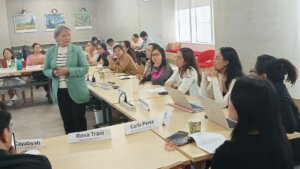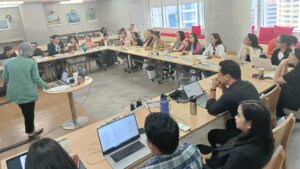How Empathy, Self-Awareness, and Social Skills Empower Great Leadership
One of the most powerful takeaways from the “Evolving from Being a Manager into a Leader” session was that leadership is not about control but connection. The shift from doing to enabling—from managing tasks to empowering people—is what separates a manager from a leader.
This insight resonated even more during our deep dive into the Harvard Business School case study of Wendy Peterson and Fred Wu. The session focused on emotional intelligence in leadership—a skill that becomes critical when navigating diverse teams, cultural nuances, and high expectations.
The Five Pillars of Emotional Intelligence
Coming into this session, I thought emotional intelligence was all about empathy. But as Dr. Grace Alcid outlined at the start of our discussion, it’s much more holistic. She introduced Daniel Goleman’s five core pillars:
- Self-Awareness – Understanding your own emotions and their impact
- Self-Regulation – Managing emotional reactions and maintaining poise
- Motivation – Being driven by values and purpose beyond external rewards
- Empathy – Seeing the world through others’ eyes
- Social Skills – Building trust, influence, and strong working relationships

Each of these matters. But in the case of Wendy Peterson and Fred Wu, self-awareness, empathy, and social skills stood out most clearly.
Authenticity and Empathy in Action
Wendy was leading a high-pressure turnaround effort as VP of Sales in AccountBack’s Plano office. Fred Wu, a promising new hire, had deep community ties and potential to open doors in an untapped market. On paper, their partnership should have been powerful. In reality, it became strained and uncomfortable.
Wu was different. His approach was relationship-driven and culturally grounded in building trust over time. But Wendy, under pressure to hit numbers fast, saw his absence from the office, loose updates, and formality as red flags.
What stood out in our discussion was how empathy could have changed the course of their relationship. Wu’s behavior wasn’t about disrespect; it was about cultural context, and Wendy misread it. She didn’t intend to dismiss his value, but without empathy, that’s exactly how it came across.
Leadership lesson: Relationships can’t thrive when people are reduced to performance outputs. Leaders must care first, guide second.
Self-Awareness: The Blind Spot That Matters Most
Peterson saw herself as a “doer”—engaged, hands-on, and solution-oriented. But her style had blind spots. She prided herself on visibility and initiative but failed to notice how her own leadership preferences were creating distance.
Instead of stepping back and asking, “Why does this dynamic feel off?” she tightened control, became frustrated with Wu’s independence, and started to doubt his intentions.
Leadership lesson: Self-awareness helps us pause before reacting. Without it, even our strengths can become liabilities.
Social Skills: More Than Being Social
Wu didn’t match the office’s informal, open-floor dynamic. He wore suits even on casual Fridays. He took calls in private. He skipped the birthday cake in the break room. But he wasn’t disengaged—he was just different.
What Wendy and the team missed was that Wu contributed in other ways: he offered training sessions, tapped his community network, and landed the region’s largest client. That’s no small feat. But without shared connection or communication, those wins didn’t build trust—they built tension.
Leadership lesson: Social skills aren’t just about charm—they’re about bridge-building across personalities, styles, and expectations.
Where Self-Regulation and Motivation Showed Up
- Self-regulation was present but strained. Wendy tried to stay composed in tough moments, but her internal tension often surfaced.
- Motivation was strong on both sides. Wendy wanted growth and team success. Wu wanted autonomy and to prove himself. But without emotional intelligence to bridge their goals, they moved in opposite directions.
Empowering People, Not Controlling Them
This case made me reflect on how often leaders try to solve things by doing more—checking in more, setting more expectations, tracking more closely. But leadership isn’t about micromanaging—it’s about creating space for others to rise.
Small things matter: asking “What do you need from me?” instead of “Why didn’t you do this?” Or creating systems that flex for diverse ways of working. These shifts unlock ownership, not just compliance.
Intentional Relationships for Mutual Growth
What I’m taking from this experience is the need to build relationships on purpose, not just to hit goals, but to grow alongside others. That means understanding people’s stories, not just their skills. And being present enough to notice when something deeper is happening beneath the surface.
Because when leaders invest in people, not just performance, they don’t just grow teams. They build cultures.
Final Thought
Wrapping up the John Clements New Managers Program with this module on “Evolving from Being a Manager into a Leader” was the perfect ending to a transformational journey. After weeks of gaining tools and frameworks, this final session reminded me that leadership is deeply human.
Dr. Grace Alcid’s discussion on emotional intelligence, paired with the Wendy Peterson case, made this session not just educational, but personal. It reinforced that leadership isn’t just about what you do. It’s about how you make others feel.
This message resonates even more for me now as a new mom and a woman leader. Like Daniel Goleman said in one of his talks, “Emotional intelligence is the key to leading a meaningful life.” I feel that more than ever. Balancing motherhood and leadership has taught me that awareness, empathy, and relational skills aren’t just helpful—they’re foundational.
As I continue to lead our team at Thrive Digital, I’m more committed to practicing emotional intelligence not just as a concept, but as a daily discipline. Our clients trust us because we treat their businesses like our own. Our team thrives because we value people first.
And I wouldn’t have gained this clarity without the opportunity provided by FTW Foundation. I’m deeply thankful to FTW Foundation for connecting me to this program as one of their proud alumni. This experience is proof that empowering women leaders, at every stage of life, can lead to a powerful impact in the workplace and beyond.
This session wasn’t just a conclusion. It was a call to lead with more heart, more awareness, and more courage.
That’s the kind of leadership I want to live—and pass on.
Ready to Lead with Heart and Clarity?
Emotional intelligence isn’t just a skill—it’s the foundation of authentic leadership. If this article inspired you, imagine what structured learning through the John Clements Leadership Institute can do.
Contact us today to learn how we can help elevate your leadership journey.






